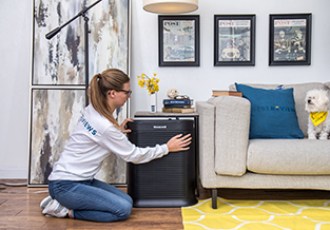We recommend these products based on an intensive research process that's designed to cut through the noise and find the top products in this space. Guided by experts, we spend hours looking into the factors that matter, to bring you these selections.

Ready to buy now? Shop the best:
Granite countertops are one of the most beautiful kitchen or bath additions you can make. They are naturally bacteria-resistant and most are sealed to prevent stains. But it’s important to know that many common household cleaning products can damage your countertops over time, leaving them dull and streaked.
To keep them shining and scratch-free, cleaning them with a specialized granite cleaner can make them sparkle again, even if you only use it once a week. Some cleaners are made specifically for removing stains, some can enhance your counter’s seal, and some are gentle enough for daily use.

First up in caring for your granite countertops is to understand the importance of sealing. Most stone is porous, although to varying degrees. It will soak up water and can stain if you are not careful to wipe up spills quickly. Sealing helps liquids roll off the countertop, instead of soak into it, decreasing the risk of staining.
If your countertops are new, you can safely assume they have been sealed. If, however, you have purchased a new home or moved into someplace that already has granite installed, the sealing could be old or worn out.
One indicator that it is time to reseal is when you begin to have problems with stains and the finish looks dull. If you notice that liquid seems to quickly soak into your countertop, it is probably time to reseal.
Sealing is a job that should be done at least once a year. If you use your countertops often, you may need to seal more often. Proper sealing requires time off your countertops — perhaps as long as a full day.
The good news is that the right kind of granite cleaner can pull many stains off of your countertop and help restore their shine. Some also help enhance sealers to make them last longer.

Many granite cleaners are made for use on several stone types, like marble, quartz, or limestone. This feature can come in handy if your household has a variety of stone countertop materials in kitchen, bars, bathrooms, or an island area. Check the labeling carefully to make sure your stone is compatible with the cleaner. Do not use a cleaner on your stone unless it is specifically listed on the label; it could damage your surface.
Keep in mind, if you’re cleaning in the kitchen, the surface you use your granite-cleaning solution on is one where you prepare food. While many are considered “use ready” after application, you may want to consider an all-natural and biodegradable cleaner for peace of mind. Most of the daily cleaners boast this feature. Some granite cleaners use safe plant-based formulations.
Those cleaners that boast a pH-neutral formulation have put together a product that is safer on your countertops than other types of cleaners. That pH balance is important because acidic cleaners can damage or weaken the seal of your countertops — potentially doing permanent damage to your surface over time.
While granite cleaners are likely to come with a “clean” fragrance, some have a more natural smell than others. In your kitchen, you may want to consider granite cleaners that smell like apple, orange, tangerine, lemongrass, or lime.
The best way to compare pricing on granite cleaners is to look at the cost per ounce on the bottle.
For about 10 to 30 cents an ounce, these cleaners will do a good basic job on your granite, but may not have the versatility for use on many stone types as other cleaners. They also won’t help boost your seal, but they won’t break it down either, like other household cleaners.
In the 30 to 50 cents an ounce range, you will find slicker-looking packaging and better stain-lifting capabilities. These cleaners should be able to handle many types of stone.
For around 50 to 90 cents per ounce, you will find granite cleaners that are also sealers. These products are the most expensive but are also needed less often.

A. While most liquids will evaporate and dry off of the top of a granite countertop, oils can leave a stain mark. To remove these kinds of marks, you can make a paste to draw the oils out of the granite and eliminate the stain.
A. If you spill something acidic, like a soda, wine, or coffee, you will want to wipe it up as soon as possible. The acid could damage your sealer. Oils can also cause stains. Use hot water to wash it clean on a daily basis. A granite cleaner can be used weekly to help boost the sealer and get at tougher stains. Polish your countertops every month. Check yearly for sealing issues, and reseal if necessary.
A. Pour one-fourth of a cup of water on the countertop. If it absorbs within ten minutes, you need to apply a sealer. If the water soaks up in less than five minutes, you will need more than one coat of sealer. If it takes more than 30 minutes, you do not need a sealer.
Get emails you’ll love.
Learn about the products you’re wondering if you should buy and get advice on using your latest purchases.
